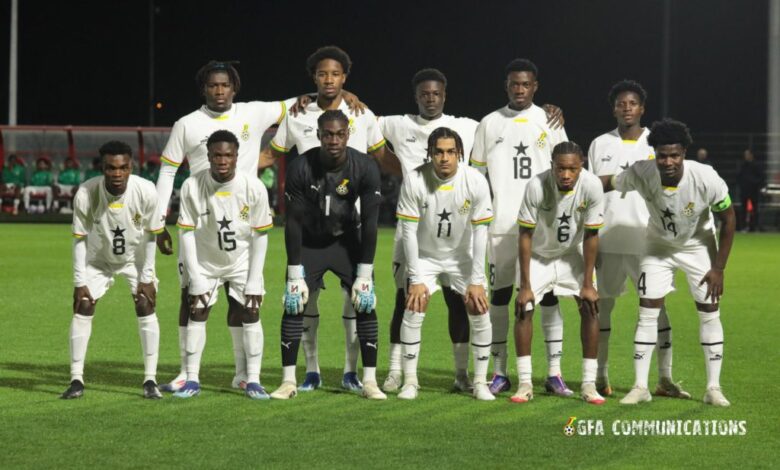
Ghana’s U-20 national football team, fondly known as the Black Satellites, experienced a gut-wrenching conclusion to their campaign for qualification to the 2025 FIFA U-20 World Cup.
The team’s aspirations were shattered in a dramatic 5-4 penalty shootout defeat against Egypt during the quarter-finals of the CAF U-20 Africa Cup of Nations (AFCON), held in Suez, Egypt.
This loss not only marked the end of Ghana’s journey in the continental tournament but also extinguished their hopes of representing Africa at the global youth football spectacle scheduled for later in 2025 in Chile.
The match, characterized by intense competition and a remarkable comeback effort, underscored the razor-thin margins that define success in African youth football, where only the top four teams from the AFCON secure coveted World Cup berths.
The Black Satellites entered the quarter-final clash with high expectations, carrying the weight of Ghana’s storied football legacy. Ghana has a proud history in youth football, having won the FIFA U-20 World Cup in 2009, the first African nation to claim the title.
However, the road to qualification in 2025 proved arduous. Facing a formidable Egyptian side on home soil, Ghana found themselves trailing 2-0 early in the match, a deficit that seemed to spell doom for their ambitions. The scoreline reflected Egypt’s early dominance, with their tactical discipline and clinical finishing putting the Black Satellites on the back foot.
Yet, the hallmark of Ghanaian football has always been resilience, and the Black Satellites embodied this spirit in Suez. Rallying from the two-goal deficit, the young Ghanaians mounted a spirited comeback, showcasing their technical prowess, determination, and unyielding belief.
Through a combination of precise attacking play and relentless pressure, they clawed their way back to level the score at 2-2 by the end of regulation time. The equalizer sparked scenes of jubilation among the Ghanaian contingent, as players and fans alike sensed a potential upset against the hosts.
The match, now a pulsating contest, extended into extra time, but neither side could find the decisive goal, setting the stage for a nerve-wracking penalty shootout.
Penalty shootouts are the ultimate test of composure, skill, and mental fortitude, and this one was no exception. Both teams traded successful conversions, with the tension mounting after each kick. Ghana’s players stepped up with courage, but a critical miss in the shootout proved to be their undoing.
Egypt capitalized, securing a 5-4 victory and advancing to the semi-finals while simultaneously booking their ticket to the 2025 FIFA U-20 World Cup.
For Ghana, the final whistle brought a wave of devastation. The Black Satellites, who had fought valiantly to overcome the odds, were left to grapple with the bitter reality of elimination.
This defeat carries significant implications for Ghanaian football. The CAF U-20 AFCON serves as the gateway to the FIFA U-20 World Cup, with only the four semi-finalists earning qualification.
Ghana’s quarter-final exit means they will miss out on the global stage in Chile, a platform where African teams have historically made their mark. The loss is particularly poignant given Ghana’s pedigree in youth football.
The Black Satellites have been a powerhouse in African and global competitions, with their 2009 World Cup triumph serving as a high-water mark. That victory, achieved against Brazil in a thrilling final, cemented Ghana’s reputation as a breeding ground for world-class talent, with players like André Ayew and Dominic Adiyiah emerging as stars.
The 2025 setback also highlights the increasingly competitive landscape of African youth football. The continent’s U-20 tournaments are fiercely contested, with emerging powerhouses challenging traditional giants.
Egypt’s victory over Ghana is a testament to the depth of talent across Africa, where nations like Nigeria, Mali, Senegal, and now Egypt consistently produce formidable youth sides.
The tournament’s structure, which grants World Cup qualification only to the top four, ensures that even a single misstep can be catastrophic, as Ghana learned the hard way.
Moreover, Ghana’s elimination fits into a broader pattern observed in youth football, where reigning champions or strong contenders often struggle to qualify for subsequent tournaments. This trend was evident with Uruguay, the 2023 FIFA U-20 World Cup champions, who failed to secure a spot for 2025.
Ghana, a former champion and perennial contender, now joins this list, underscoring the unpredictable and unforgiving nature of youth international competitions.
The pressure to perform, coupled with the rapid turnover of players due to age restrictions, makes consistency at this level a formidable challenge.
For the Black Satellites, the focus now shifts to reflection and rebuilding. The team’s performance, despite the outcome, showcased the potential of Ghana’s next generation of footballers.
Their ability to fight back from a 2-0 deficit against a strong Egyptian side speaks to their character and talent. However, the penalty shootout loss will serve as a painful lesson in the importance of precision and mental resilience in high-stakes moments.
The coaching staff, led by experienced figures in Ghanaian football, will likely analyze the campaign to identify areas for improvement, particularly in maintaining consistency and handling pressure situations.
The broader Ghanaian football community will also feel the weight of this disappointment. Football is a unifying force in Ghana, and the Black Satellites’ campaigns are followed with fervent passion.
Fans, who had hoped to see their young stars shine in Chile, will now rally behind the team for future challenges. The next CAF U-20 AFCON, which serves as the qualifier for the 2027 FIFA U-20 World Cup, offers a chance for redemption.
Ghana’s football authorities, including the Ghana Football Association (GFA), will need to invest in grassroots development, scouting, and player preparation to ensure the Black Satellites return stronger.
In the grand scheme of African football, Ghana’s exit is a reminder of the high stakes and relentless competition that define the continent’s youth tournaments.
The 2025 CAF U-20 AFCON in Suez has already produced moments of brilliance and heartbreak, with Egypt emerging as one of the teams to watch in Chile. For Ghana, the journey may have ended in disappointment, but the Black Satellites’ legacy endures.
Their fighting spirit, showcased in the face of adversity, is a beacon of hope for the future of Ghanaian football. As the nation looks ahead, the lessons learned in Suez will fuel their determination to reclaim their place among the world’s elite youth teams.




